CornerStone evolves as a Family Resource Center
News | Published on February 25, 2025 at 2:26pm EST | Author: frazeevergas
0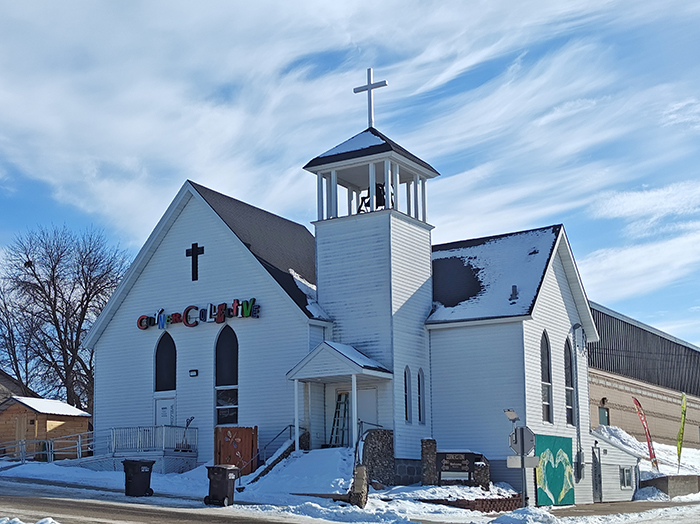
CornerStone is making a third transformation by adding a Family Resource Center to the youth and community center and bistro thanks to a Sauer Family Foundation grant to implement work for the next two years.
By Robert Williams
Editor
Thanks to a Sauer Family Foundation grant to implement work for the next two years, the lower level CornerStone Community and Youth Center, along with the upper level Corner Collective: Bistro, Arts & More will be gaining a third title as a Family Resource Center (FRC).
A FRC is a community or school-based welcoming hub of support, services and opportunities for families based on the nationally recognized Family Resource Center model. This model uses a multi-generational, strengths-based and family centered approach, reflecting and responsive to community needs and interests and providing support for low or no cost for participants. FRCs are a community led model, reducing the footprint of government in serving communities, while fostering collaboration between local organizations, community and government. There are over 3,000 FRCs across the country in 40 states and the District of Columbia, with the oldest serving families for up to 30 years in some locations.
“The one nice thing about CornerStone is we are already hitting a lot of the programming aspects,” Executive Director Mackenzie Hamm said.
There are not a lot of differences between a FRC and what CornerStone already is.
“That’s why we were a good fit,” said Hamm.
The main difference is being a resource for children from birth to young adults. Currently, CornerStone Youth Center services children fourth grade and up.
The Youth Center will continue as it has with its activities and providing a safe space for kids. As a FRC, the programming is more about supporting young families. That support revolves around five protective factors: Resilience, Social Connection, Knowledge of Parenting and Child Development, Social and Emotional Competence of Children and Concrete Supports.
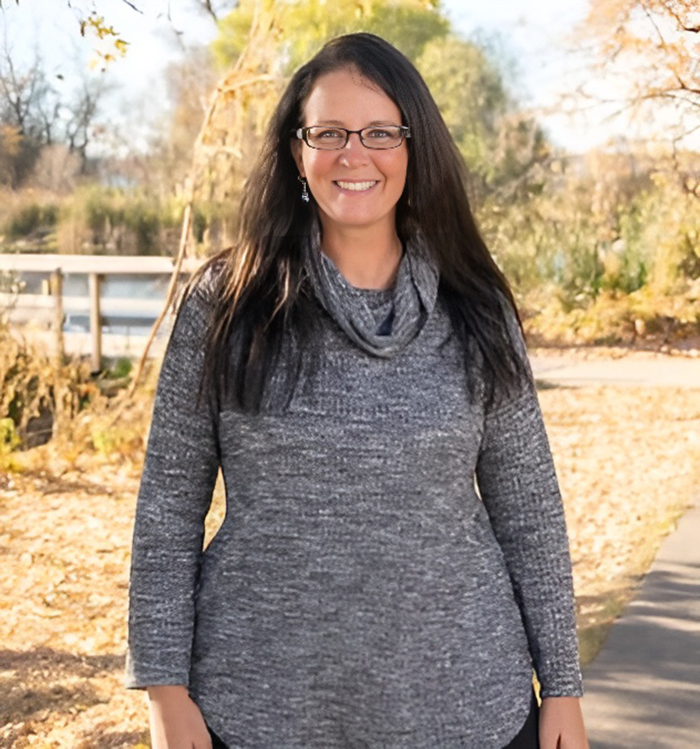
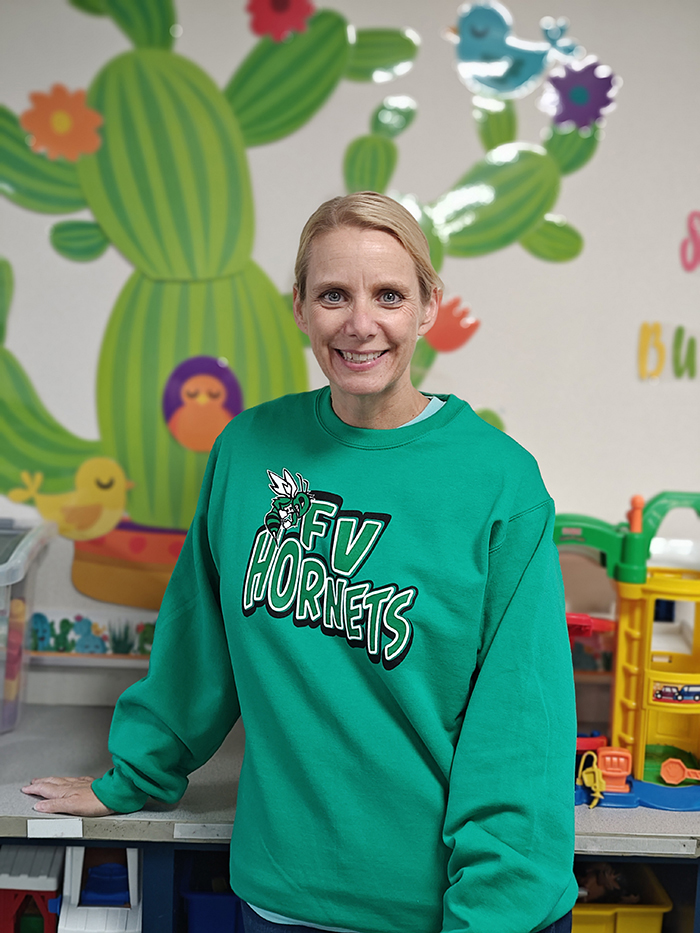
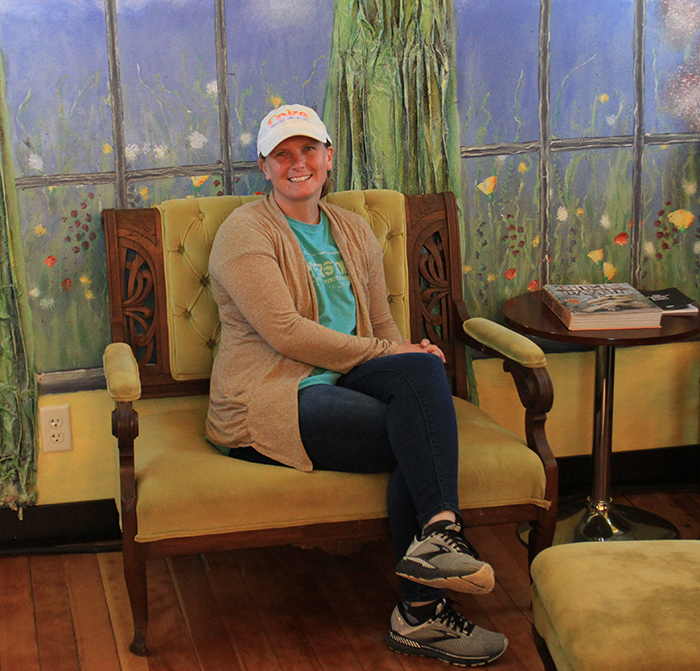
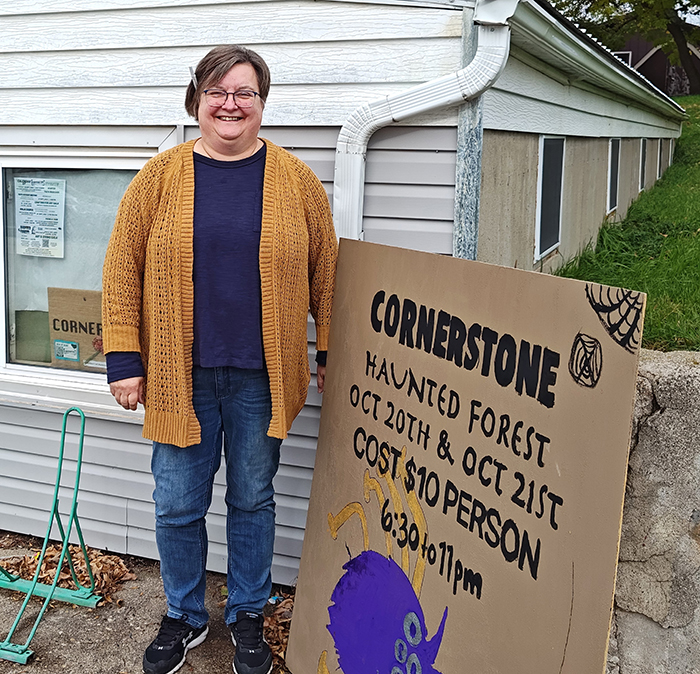
CornerStone is making a third transformation by adding a Family Resource Center to the youth and community center and bistro thanks to a Sauer Family Foundation grant to implement work for the next two years. Among the many key members of Cornerstone are CornerStone Executive Director Mackenzie Hamm (top right), CornerStone Youth Director Sandy Oelfke (bottom), Frazee-Vergas ECFE Coordinator Kimberly Antonsen (top middle) and CornerStone Board Member and Creating Community Consulting Co-Owner Karen Pifher (top left).
In more detail:
• Parental resilience is the flexibility and inner strength to bounce back when things aren’t going well. Resiliency skills really come into play when parents are dealing with life stressors like moving, a new job, death in the family, poor relationships or isolation, lack of support, children with behavioral issues, past trauma, substance abuse history or pervasive abuse in and out of the home.
• Social connections tend to create happier people and more supportive parents. That means nurturing or finding trusted loved ones and mentors wherever people can—be it supportive friends, getting involved in church, volunteering, getting to know neighbors or coworkers, getting involved in community programs, sports, the gym, support groups or professional counseling.
• Knowledge of parenting and child development: As children quickly grow, parents should educate themselves about the developmental stages to best meet their child’s needs from infancy to up into their teen years.
• Social and emotional competence of children means learning to set healthy boundaries, be a good listener, being okay with making a mistake, and being able to take responsibility, take criticism, share feelings, empathize with others and build rapport.
• Concrete support in time of need can include all sorts of things, such as after-school recreation centers, childcare, mental health counseling, parenting classes, food banks, and housing assistance.
“Studies have shown if you have a Family Resource Center and places for parents to go, it will help prevent out-of-home placements later on. They’ll have tools, support and education and other resources. We know, in Becker County, we have Mahube, which is a wealth of knowledge and resources. We have Becker County Human Services who have tons of resources. Here, what can happen is say there is a young mom and she’s really struggling with breastfeeding. My knights aren’t going well. I’m exhausted and tired. We can be like okay, let’s sit down and have a conversation and find out who could be the best connection for you. Maybe she doesn’t know that there is a nurse that can talk to her.”
Assistance will not necessarily be provided at CornerStone, but people using the Resource Center will be able to find out where assistance will be available.
“Maybe in the future, we could have somebody onsite with some office time; maybe one of the health nurses can come here on Mondays and be here for anybody that needs to see me,” said Hamm.
For instance, the FRC side of CornerStone has already started a support group for parents of children who died by suicide.
“We’re doing peer support groups, as well,” Youth Director Sandy Oelfke said.
The major point of FRCs is making a difference in the lives of families in the community and county-wide. The model has a history of doing just that.
Based on studies in multiple jurisdictions, FRCs have demonstrated impact in the following areas, according to The California Evidence-Based Clearinghouse for Child Welfare:
• $4.93 Social Return on Investment for every dollar invested
• $3.65 savings for the child welfare system for every dollar invested
Gains in economic self-sufficiency, health, social support, family functioning and resiliency, child nurturing and healthy attachment Improvements in children’s educational success:
• 63 percent reduction of child abuse cases
• 50 percent reduction of out of home placements
• 26 percent lower rates of community-level child abuse investigations
CornerStone is also planning to partner with the Early Childhood Family Education program at the elementary school and Coordinator Kimberly Antonsen.
Communication is key to success at an FRC as CornerStone is capable of adapting to needs to be addressed. It’s finding out what those needs are that are key to providing the necessary resources to help children and families.
“We also have a parent advisory committee, made up of parents and grandparents, that meets monthly to discuss what they see as needs in the area and we talk about how we can meet those needs,” said Oelfke. “Good things have come from that.”
How the transformation to a FRC began was someone reaching out to CornerStone Board Member Karen Pifher about the need and the fact that Becker County did not yet have a host for a FRC.
“They’re popping up in multiple counties all over Minnesota,” said Hamm.
Pifher’s company Creating Community Consulting (CCC) is one of the only agencies in Minnesota doing community health assessments in the state. Pifher and CCC co-owner Megan Jenson are two of the only four trainers in Minnesota to support development of FRCs.
“We’ve been part of the driving force behind the scenes on how to get them into, specifically, rural Minnesota, and then to train communities on how to build strong programs,” said Pifher.
Besides CornerStone, Pifher and Jenson have worked on FRCs in Clay County, Pelican Rapids in Otter Tail County, Countryside Public Health, which covers Big Stone, Chippewa, Lac qui Parle, Swifty and Yellow Medicine counties in southwestern Minnesota, Kandiyohi and Renville Counties. In total there are 18 counties serviced by CCC.
“And we’re having a lot of fun with it,” Pifher said.
CCC is also preparing to apply for a two-year, $450,000 grant for CornerStone to add a large addition to the current building to aid in the FRC efforts.
The first FRC was developed by the county and community partners in Scott County through the Together We Can initiative to end child abuse. Currently, three sites are open in Scott County. Additional sites opened in June 2023 in Polk and Pine Counties through support of dedicated ARPA funds and Sauer Family Foundation implementation grants.
Becker, Olmsted and Sherburne Counties have collaborated with community partner agencies, opening FRCs in early 2025. Additional FRCs will be opening this year. With support from the Sauer Family Foundation, 30 counties and community partners are at some stage of developing or implementing a Family Resource Center, with more than 10 counties in conversation with the Foundation to begin community assessments.
In 2023, the state legislature passed legislation that established $7.1 million in grant funding for Community Resource Centers (CRC) and authorized the creation of an advisory council. AMC, in collaboration with the Children’s Cabinet, Department of Human Services and community partners, supported this legislation. Family Resource Centers are eligible for this grant funding—recently Family Services Rochester (a collaboration that includes Olmsted County), Clay, Hennepin and St. Louis Counties were awarded state grants for FRC development.
Having built relationships through CornerStone with existing families has made the move to a FRC easier than beginning from scratch.
“We’ve developed a relationship with quite a few families, even though we’ve been fourth grade and up, a lot of them do have younger siblings,” said Hamm.
There is an excitement about CornerStone launching its FRC because of that.
“Even prior to being titled a FRC, Sandy and I have already been mentoring different parents and things like that,” said Hamm. “It’s been just a natural thing.”
Both Hamm and Oelfke have been busy completing specific training to make sure they are touching on the five protective factors and having high standards of quality.
“We’re pretty excited about it,” said Hamm.
“Because we’ve done so much of it already,” said Oelfke.
Programs are close to beginning as early as March, the first being Mommy and Me Yoga on Monday nights.
There will be a county-wide survey to identify what the community needs from hours of operation to different events. The larger goal is out of those events and groups young families will get to know each other and become resources for each other.
“They’ll get to know other people in the same circle of life and then it will build relationships, it will build trust, so when they do go through that crisis mode they will have a friend to call because they’ve developed those relationships.”
An official launch day for the FRC is scheduled for Sunday, April 27, at the Event Center.
Between now and then, the full list of activities and group work will be released.
“It’s been great; we’ve been crazy busy with kids; I bet we had 10 new kids last night,” said Hamm. “We’re still hitting the needs with kids and the bistro is going well.”
Hamm noted that word has gotten out about the bistro and she and Oelfke have provided many tours of the entire facility to show bistro diners what it is they are supporting in the youth center.
“We’ve had more and more people from other communities who stop in and ask us how we’ve done this and that’s inspiring,” said Hamm.”
That specific question will be answered in a conference planned at the Event Center March 20-21.
For more information visit: cornerstonefrazee.org and follow CornerStone: Frazee Community and Youth Project on Facebook.

